|
|
|
Sort Order |
|
|
|
Items / Page
|
|
|
|
|
|
|
| Srl | Item |
| 1 |
ID:
172979
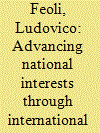

|
|
|
|
|
| Summary/Abstract |
Ludovico Feoli comments on a small Central American state’s approach to maximising its international diplomatic projection.
|
|
|
|
|
|
|
|
|
|
|
|
|
|
|
|
| 2 |
ID:
127616
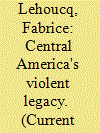

|
|
|
|
|
| Publication |
2014.
|
| Summary/Abstract |
Armed conflict liquidated Central America's dictatorships by the end of the twentieth century. Only Costa Rica was democratic when a wave of civil wars broke out in the 1970s; by the mid-1990s, every country on the isthmus had replaced dictators or military juntas with elected presidents and legislators. Every nation in the region now allows adults at least 18 years old (or 16, in Nicaragua) to cast ballots in regularly scheduled elections
|
|
|
|
|
|
|
|
|
|
|
|
|
|
|
|
| 3 |
ID:
017003
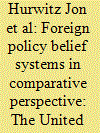

|
|
|
|
|
| Publication |
Sept 1993.
|
| Description |
245-270
|
|
|
|
|
|
|
|
|
|
|
|
|
|
|
|
| 4 |
ID:
094897
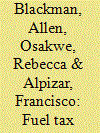

|
|
|
|
|
| Publication |
2010.
|
| Summary/Abstract |
Although fuel taxes are a practical means of curbing vehicular air pollution, congestion, and accidents in developing countries-all of which are typically major problems-they are often opposed on distributional grounds. Yet few studies have investigated fuel tax incidence in a developing country context. We use household survey data and income-outcome coefficients to analyze fuel tax incidence in Costa Rica. We find that the effect of a 10% fuel price hike through direct spending on gasoline would be progressive, its effect through spending on diesel-both directly and via bus transportation-would be regressive (mainly because poorer households rely heavily on buses), and its effect through spending on goods other than fuel and bus transportation would be relatively small, albeit regressive. Finally, we find that the overall effect of a 10% fuel price hike through all types of direct and indirect spending would be neutral and the magnitude of this combined effect would be modest. We conclude that distributional concerns need not rule out using fuel taxes to address pressing public health and safety problems, particularly if gasoline and diesel taxes can be differentiated.
|
|
|
|
|
|
|
|
|
|
|
|
|
|
|
|
| 5 |
ID:
185069
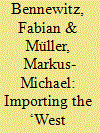

|
|
|
|
|
| Summary/Abstract |
In analyzing West German police assistance for Costa Rica, we uncover the transnational dynamics of Cold War counterinsurgency policing during the Central American conflicts of the 1980s. We scrutinize West Germany’s engagements with Costa Rica, demonstrating how technical police assistance by the self-fashioned West German ‘civilian power’ fed into a wider counterinsurgency turn in Costa Rican policing. Highlighting the role of local agency and transnational context conditions, we point towards the interest of the Costa Rican government in reaching out to West Germany to demonstrate its neutrality within the ongoing conflicts while simultaneously bolstering the counterinsurgency capacities of its police forces.
|
|
|
|
|
|
|
|
|
|
|
|
|
|
|
|
| 6 |
ID:
143537
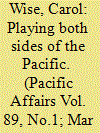

|
|
|
|
|
| Summary/Abstract |
One of the most prominent trends in Latin America in the 2000s has been the proliferation of bilateral free trade agreements (FTAs) across the Pacific basin. Beginning with the path-breaking Chile-Korea FTA in 2004 up to the Costa Rica-Singapore FTA in 2013, the past decade has seen the negotiation of twenty-two cross-Pacific accords. China, too, has jumped on to the cross-Pacific FTA bandwagon, including its negotiation of separate bilateral FTAs with Chile (2006), Peru (2009), and Costa Rica (2011). This paper analyzes the origins, content, and preliminary outcomes of these three China-Latin America FTAs. The findings are threefold: 1) in contrast with other cross-Pacific FTAs, which include at least one developed country, the three FTAs analyzed in this paper constitute “south-south” FTAs; yet, in contrast with other south-south FTAs, these three China-Latin America accords approximate WTO+ standards vis-à-vis the World Trade Organization (WTO) and its new trade agenda (services, investment, and intellectual property rights); 2) although the motives for negotiating these developing- developing country accords varied, on the part of China and the countries themselves, this did not disrupt the march toward WTO+ status; and 3) while all three of these FTAs elude standard theoretical explanations for the negotiation of bilateral FTAs, the three Latin American countries do share similar reform trajectories and institutional affinities, which sheds light on the decision and capacity of each to negotiate a bilateral FTA with China.
|
|
|
|
|
|
|
|
|
|
|
|
|
|
|
|
| 7 |
ID:
117998
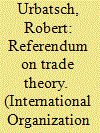

|
|
|
|
|
| Publication |
2013.
|
| Summary/Abstract |
Research on mass opinion in international political economy overwhelmingly relies on survey data. This poses problems of external validity, especially for a frequently low-salience issue such as trade policy. To examine whether survey findings about attitudes toward economic openness apply outside of surveys, this note considers patterns of voting in the 2007 Costa Rican plebiscite about joining the Central American Free Trade Area. Several extant theories appear to explain voting patterns, but the results are less in line with traditional economic models based on locally important economic sectors.
|
|
|
|
|
|
|
|
|
|
|
|
|
|
|
|
| 8 |
ID:
116878
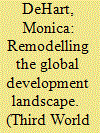

|
|
|
|
|
| Publication |
2012.
|
| Summary/Abstract |
China's explosive growth and growing international influence have prompted policy makers and scholars to question how that country will reshape the global development landscape. While Western observers have used the concept of the China Model to describe China's development strategies and the potential threat they pose to Western liberal traditions, Chinese policy makers have promoted South-South cooperation to emphasise China's goal of a harmonious world order based on nation-state sovereignty and mutual benefits. This article explores these two competing organising principles with a focus on how each concept frames global development politics and China's relations with its development partners. Drawing on ethnographic research on China's new relationship with Costa Rica, I examine the assumptions and effects of these concepts in terms of how they shape specific development encounters. These examples suggest the intransigence of historical development inequalities and identities, which both support and limit China's global impact in significant ways.
|
|
|
|
|
|
|
|
|
|
|
|
|
|
|
|
| 9 |
ID:
126727
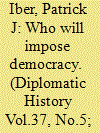

|
|
|
|
|
| Publication |
2013.
|
| Summary/Abstract |
This article examines the life of Sacha Volman (1923-2001), a Romanian exile who became a key conduit for CIA support to Latin America's anticommunist left during the Cold War. It traces the evolution of the front groups that underwrote his activities, his involvement with institutes for political training and the production of propaganda in Mexico and Costa Rica, and, most importantly, his organizing in support of the short-lived presidency of Juan Bosch (1963) in the Dominican Republic. The article argues that, contrary to traditional accounts, the Cold War environment and the actions of the United States provided certain opportunities for the political left in the region-provided, of course, that it was an anticommunist left. Yet CIA support was a weak form of commitment on the part of the United States. In the end, Volman's ally Bosch was overthrown and President Johnson sent troops to prevent him from being restored to power, while much of the propaganda produced by his movement was easily appropriated by the very powers that had deposed it. Acceptance of the hegemonic position of the United States and its anticommunist agenda-the same thing that gave social democratic parties their lease on life in the international arena-left them with little political flexibility.
|
|
|
|
|
|
|
|
|
|
|
|
|
|
|
|
|
|
|
|
|